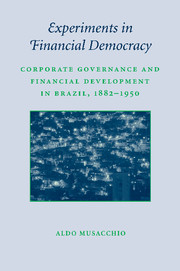 Experiments in Financial Democracy
Experiments in Financial Democracy Book contents
- Frontmatter
- Contents
- List of Figures and Tables
- Preface
- Acknowledgments
- 1 Introduction
- 2 Financial Development in Brazil in the Nineteenth Century
- 3 The Stock Exchange and the Early Industrialization of Brazil, 1882–1930
- 4 The Foundations of Financial Democracy: Disclosure Laws and Shareholder Protections in Corporate Bylaws
- 5 Voting Rights, Government Guarantees, and Ownership Concentration, 1890–1950
- 6 Directors, Corporate Governance, and Executive Compensation in Brazil, c. 1909
- 7 Bond Markets and Creditor Rights in Brazil, 1850–1945
- 8 Were Bankers Acting as Market Makers?
- 9 What Went Wrong after World War I?
- 10 The Rise of Concentrated Ownership in the Twentieth Century
- 11 Conclusion
- Bibliography
- Index
- STUDIES IN MACROECONOMIC HISTORY
6 - Directors, Corporate Governance, and Executive Compensation in Brazil, c. 1909
Published online by Cambridge University Press: 30 January 2010
- Frontmatter
- Contents
- List of Figures and Tables
- Preface
- Acknowledgments
- 1 Introduction
- 2 Financial Development in Brazil in the Nineteenth Century
- 3 The Stock Exchange and the Early Industrialization of Brazil, 1882–1930
- 4 The Foundations of Financial Democracy: Disclosure Laws and Shareholder Protections in Corporate Bylaws
- 5 Voting Rights, Government Guarantees, and Ownership Concentration, 1890–1950
- 6 Directors, Corporate Governance, and Executive Compensation in Brazil, c. 1909
- 7 Bond Markets and Creditor Rights in Brazil, 1850–1945
- 8 Were Bankers Acting as Market Makers?
- 9 What Went Wrong after World War I?
- 10 The Rise of Concentrated Ownership in the Twentieth Century
- 11 Conclusion
- Bibliography
- Index
- STUDIES IN MACROECONOMIC HISTORY
Summary
Shareholder abuse today is commonly associated with excessively large executive compensation packages or outright fraud. Directors extract value, for example, through compensation packages that pay large fixed salaries and provide significant additional payments or fees if a company meets or exceeds performance goals. But many of these concerns are related to the secrecy of executive compensation. Both in Brazil and in other places such as the United States, shareholders in large corporations have no clear idea of how much the CEO makes after stock options and other fees and benefits are taken into account.
During the period under study in this book, Brazilian companies exhibited a very different approach to executive compensation. The statutes of all corporations had to be published in newspapers with wide circulation (in the state where the company was going to operate) and these statutes included valuable information for shareholders, including the fixed salary of all of the directors and the percentage of profits that they would receive as performance-based compensation.
The company statutes of Brazilian corporations typically included three provisions to keep directors' incentives aligned with those of shareholders. First, most company bylaws required that directors be shareholders. On average, corporations required that directors own at least 1.2% (standard deviation 2.5%) of total paid-up capital and keep their shares on deposit with the company throughout their tenure, a provision referred to as directors' “qualifications” in company statutes. Second, corporate statutes typically required that directors' annual or monthly fixed salaries be disclosed. Third, shareholders often used additional performance-based compensation to align directors' interests with their own.
- Type
- Chapter
- Information
- Experiments in Financial DemocracyCorporate Governance and Financial Development in Brazil, 1882–1950, pp. 135 - 154Publisher: Cambridge University PressPrint publication year: 2009
